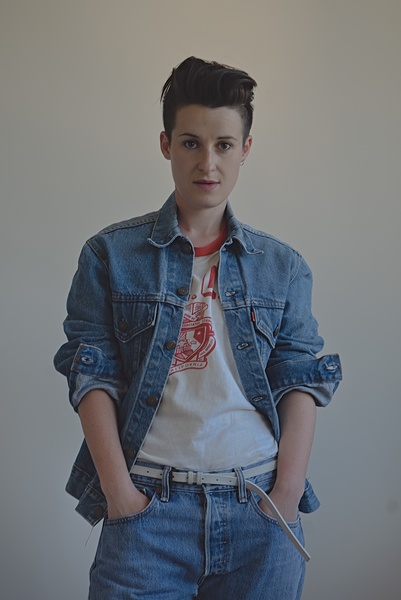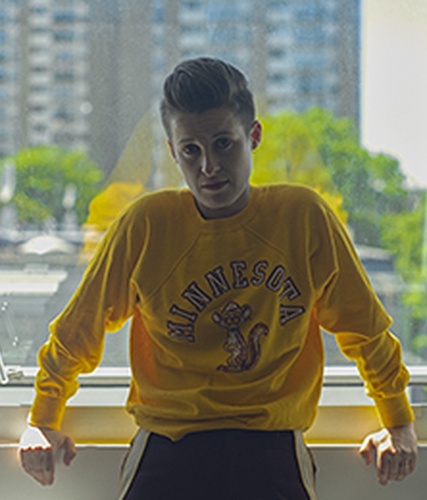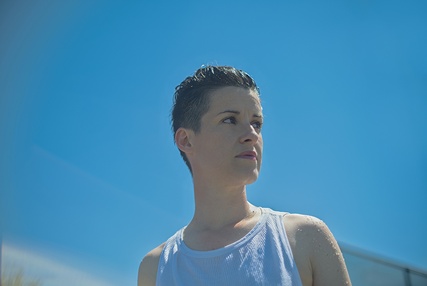Lucie Antunes en studio
Aller à l’essentiel - les enjeux artistiques
Formée au CNSMD de Lyon, Lucie Antunes connaît parfaitement l’Ircam, sa réputation sur la scène contemporaine et dans le domaine de la recherche scientifique. Une excellence qui l’attire depuis bien longtemps. Évoluant dans l’univers dit des « musiques actuelles », les outils auxquels la jeune batteuse et percussionniste a recours dans sa pratique de l’électro ne sont certes pas ceux développés à l’Ircam : de son propre aveu, elle privilégie « une approche intuitive » de l’informatique musicale. Cette résidence à l’Ircam ne lui apparaît pas moins comme une évidence, de par son parcours et ses aspirations technologiques et artistiques.
Initiée à l’automne, cette collaboration intervient en outre à un tournant dans son approche de l’écriture, la compositrice s’étant engagée dans une vaste démarche de décomplexification.
Dans son premier album intitulé Sergueï en 2019 (sur INFINE et CRYBABY), certains sons, certaines textures, étaient le résultat d’associations d’instruments multiples, aussi variés que le marimba ou les Ondes Martenot :
« Certains morceaux étaient constitués d’un empilement de plus de 200 pistes ! dit Lucie Antunes. J’ai voulu voir si cette complexité ne masquait pas des lacunes dans la composition elle-même : j’avais besoin d’une forme d’épure, d’utiliser moins de matière, de chercher des couleurs différentes, avec un travail sur les voix, sur des couleurs plus "club", et surtout sur une plus grande lisibilité du discours. Ce sont aussi des morceaux plus courts, d’environ 3 minutes au lieu de 10 minutes dans le premier album. Bref, j’avais besoin de vider la valise et d’aller à l’essentiel. Voilà deux ans que je suis dessus et chaque fois que je réécoute ces morceaux, ça me fait du bien. »
Le résultat, c’est Carnaval, un deuxième album (à sortir en avril prochain, toujours sur INFINE et CRYBABY) nourri de cette folie libératrice que dégage l’esprit de cette fête si particulière, dont l’objet premier est de renverser les normes et les hiérarchies sociales. Lucie Antunes y a recours à tous ces instruments parfois rudimentaires que l’on entend dans les carnavals du monde entier — gongs, sifflets, percussions de toutes sortes, voix et cris, mêlés à des textures empruntées à Meredith Monk. Mais, précise-t-elle, « c’est un carnaval de 2023 : c’est donc aussi un carnaval de la modernité ».
Vider la valise - les enjeux technologiques
 Vider la valise, c’est aussi, littéralement, ce que Lucie Antunes est venue faire à l’Ircam. Car si la musique est déjà écrite, si l’album est déjà dans la boîte, la tournée, elle, est à venir. Une tournée qui, en l’état, aurait nécessité une logistique encombrante, puisque cette musique est destinée à un instrumentarium riche et varié : vibraphone, marimba, gongs, cloches tubulaires et bien d’autres… « En concert, cela suppose beaucoup de manutention, dit-elle, et ce n’est pas très agréable au quotidien. Les synthétiseurs permettent de voyager plus léger. Le problème, c’est que, tels qu’ils existent, ils font l’impasse sur le geste instrumental en même temps que sur la richesse timbrale. »
Vider la valise, c’est aussi, littéralement, ce que Lucie Antunes est venue faire à l’Ircam. Car si la musique est déjà écrite, si l’album est déjà dans la boîte, la tournée, elle, est à venir. Une tournée qui, en l’état, aurait nécessité une logistique encombrante, puisque cette musique est destinée à un instrumentarium riche et varié : vibraphone, marimba, gongs, cloches tubulaires et bien d’autres… « En concert, cela suppose beaucoup de manutention, dit-elle, et ce n’est pas très agréable au quotidien. Les synthétiseurs permettent de voyager plus léger. Le problème, c’est que, tels qu’ils existent, ils font l’impasse sur le geste instrumental en même temps que sur la richesse timbrale. »
L’idée est donc de fabriquer des instruments électroniques de contrôle des synthétiseurs, mais de sorte que la musicienne puisse retrouver les sensations qu’elle a avec les instruments acoustiques.
« Je veux garder le geste de percussionniste, avec toute la richesse de jeu que cela suppose. Nous avons par exemple travaillé sur un marimba MIDI, d’abord pour affiner la restitution des attaques et des dynamiques du rendu sonore, puis pour contrôler d’autres types d’échantillons instrumentaux faisant partie de mon set d’instruments. Il faut donc à la fois échantillonner ces instruments, mais aussi les associer au geste correspondant, afin que le synthétiseur puisse produire le son désiré. Comme un trompe-l’oreille. À l’avenir, on ira peut-être vers la synthèse d’autres sons même si, personnellement, entendre un orgue déclenché par un geste de percussion me trouble un peu : je n’y suis pas très sensible. »
Charge, aussi, aux chercheurs de l’Ircam de rendre ces nouveaux instruments plus ergonomiques.
« Je suis performeuse, précise Lucie Antunes. Pas geek pour un sou, contrairement à ce qu’on pourrait penser. Pour composer, j’utilise des outils technologiques, mais je ne rentre pas dans les lignes de code. Avec les scientifiques de l’Ircam, nous allons rendre ces nouveaux instruments plus faciles à apprivoiser, à la manière des instruments acoustiques. »
Lucie Antunes © Marco Dos Santos




